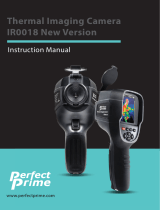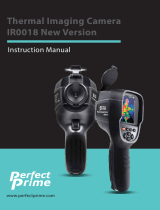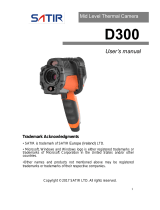Page is loading ...

ThermalTronix
TT-ET2W-HTI
User Manual

1
! Warnings, Cautions and Notes
Definitions
WARNING Could cause bodily injury or death.
CAUTION Could cause damage to equipment or permanent loss of data.
NOTE provides useful information to the operator.
Important Information – Read before using the Instrument
WARNING – Laser Radiation is emitted from this device. Do Not stare
into Laser Beam. Class 2 Laser, 635 nm, 0.9mW
CAUTION - Never point the lens directly toward a strong radiation source
(ie. Sun, direct or reflected laser beam, etc ), with power on or power off, as
damage may result to the thermal detector used inside. Permanent
damage may result!
CAUTION - The original shipping carton should be kept for use for future
transportation. Do not drop, shake or impact the thermal imager
excessively, in use or during transportation.
CAUTION - Store the unit in its original case in a cool, dry, well-ventilated
area away from strong electromagnetic fields.
CAUTION - Protect the surface of the lens from being stained or damaged
by foreign objects such as sludge or chemicals. Please replace the lens cap
after use.
CAUTION - Please remember to backup image data regularly to avoid
losing important data.
NOTE - For maximum measurement accuracy, allow 3 to 5 minutes for
camera to stabilize after initial power up.

2
NOTE - Each camera is factory calibrated. It is recommended that
calibration be performed every 12 months.
CAUTION - Do not open case. Unit does not contain any user serviceable
parts. Repair should be performed by factory authorized technicians only.

3
Contents
! Warnings, Cautions and Notes ......................................................... 1
1 Introduction ................................................................................ 5
2 lines measurements .................................................................. 5
1.1 Standard accessories ................................................................................................ 7
1.2 Optional accessories .................................................................................................. 7
2 Camera overview ......................................................................... 8
2.1 Function keys .............................................................................................................. 8
2.2 Interface....................................................................................................................... 12
3 Basic operations ........................................................................ 13
3.1 Battery Installation and Replacement .............................................................. 13
3.1.1 Inserting or removing battery ..................................................................... 13
3.1.2 Replacing battery .............................................................................................. 14
3.2 Battery safety and usage ...................................................................................... 15
3.3 Quick access ............................................................................................................... 16
3.3.1 Capture an image ............................................................................................. 16
3.3.2 Temperature Measurement ........................................................................... 16
3.3.3 Save Image ......................................................................................................... 17
3.3.4 Playback Image ................................................................................................. 17
3.3.5 Download the Save Files ................................................................................ 18
3.3.6 Screen Setting ................................................................................................... 18
3.3.7 Manu Operation Introduction ....................................................................... 18
4 Operation guide ......................................................................... 19
4.1 Graphic interface description ............................................................................... 19
4.1.1 Screen graphic interface ................................................................................ 19
4.1.2 Floating Bar Interface ..................................................................................... 20
4.1.3 Main Menu ........................................................................................................... 21
4.1.4 Sub-menu interface ......................................................................................... 21
4.2 Measurement Object Adding ................................................................................ 22
4.3 Recording ..................................................................................................................... 23
4.4 Photo ............................................................................................................................. 23
4.5 Preview ......................................................................................................................... 24
4.6 Setting .......................................................................................................................... 24
4.6.1 Measuring setting ............................................................................................. 28
4.6.2 Adjustment .......................................................................................................... 29

4
4.6.3 Image Setting .................................................................................................... 30
4.6.4 Network setup .................................................................................................... 33
4.6.5 TF Card Management ...................................................................................... 34
4.6.6 Photo Setting ...................................................................................................... 36
4.6.7 System Setting .................................................................................................. 37
4.7 File Management....................................................................................................... 40
4.7.1 Playback ............................................................................................................... 40
4.7.2 Bluetooth Transmission .................................................................................. 43
4.7.3 Delete .................................................................................................................... 44
5 Webpage operate ....................................................................... 45
5.1 Webpage login ........................................................................................................... 45
5.2 Surveillance image ................................................................................................... 45
5.3 Function operate ....................................................................................................... 46
5.3.1 System parameter set .................................................................................... 47
5.3.2 Photo Setting ...................................................................................................... 48
5.3.3 Graphic setting .................................................................................................. 48
5.3.4 Measurement Setting ...................................................................................... 49
5.3.5 Network ................................................................................................................ 49
5.3.6 Local Settings ..................................................................................................... 50
5.3.7 System Maintenance ....................................................................................... 50
6 Configuration ............................................................................. 52
7 Troubleshooting ......................................................................... 54

5
1 Introduction
Thank you for choosing Instruments “TT-ET2W-HTI” hand-held infrared
thermal imager.
Model Identification
TT-ET2W-HTI imagers use the detector with 25um 384*288, and
measurement range from +30°C~+42°C
Features
TT-ET2W-HTI includes the following features:
11 user selectable color palettes
11 user selectable languages
2X ,4X digital zoom
5 removable spot measurements
5 Areas measurements
2 lines measurements
Custom shortcuts
Blue tooth
Power saving mode
LCD Brightness adjustment
Video Output – NTSC or PAL
Internet settings
Time and Date settings
Factory settings restore
TF card uninstall, formatting
TF card image storage, video storage
Text and Audio annotation via image storage
Consecutive image shot storage

6
Alarm image capture
Alarm video record
Isotherm measurement function
Temperature measurement settings
Built in Emissivity Table list of common materials
CMOS visible image and storage
Infrared and visible image fusion
Merge set
Applications:
Preventive maintenance
Power industry: Power line and power facility thermal state checking;
problem and defect diagnosis.
Electrical system: Identify potential circuit overloads.
Mechanical system: Reduce downtime and avoid catastrophic failure.
Construction science
Roof: Quick identification of water penetration problems.
Structure: Commercial and residential energy audits.
Moisture detection: Determine root cause of moisture and mildew.
Evaluation:Evaluate the resolution to ensure the area completely dry.
Others
Iron and steel industry: Inspect steel refining and rolling processes;
diagnose hot-blast stove defects; detect the embryo temperature of armor
plate, etc.
Fire fighting: Forest fire prevention and detection of latent ignition
source. Preventive detection on specific materials of auto-ignition. Detection
of potential spark ignition sources.
Medical: Human body surface temperature detection and screening.

7
Petro/chemical: Oil pipeline status inspection; material surface
temperature detection; insulation inspection; power equipment status, etc.
1.1 Standard accessories
Infrared thermal image camera (with wrist strap)
Carrying case
Video out cable
Lithium ion batteries
User manual, Infrared report and analysis software system CD
Lithium battery charger
Lens cap
TF card
TF card reader
USB cable
Black body
1.2 Optional accessories
External 0.5x wide-angle lens
External 2x telescopic lens
Eye patch
Power adapter(with power cable and plug)
European standard plug
British standard plug
Australian standard plug

8
2 Camera overview
2.1 Function keys
2
3
1
4
5
6
7

9
[1] Power key
Press and hold the Power Key for > 3 seconds to power on/off the camera.
! Note: After powering off, please wait ten seconds before powering the
camera on again.
[2] Select/Auto key (Marked “A”)
The “A” or attribute button performs 2 functions.
a) The first function is modification of selected parameters. It is obtained
by a quick press and release (less than 2 seconds), with this functions to
modify their parameters. Subsequent presses will “scroll” through the
available parameters. The selected function will be highlighted in yellow. The
functions include:
Measurement points, areas, and lines
Points, areas, lines – switching the added points, areas and lines in the
interface from Up to Down, press Menu to set properties, press C to delete the
Selected measuring objects.
Color Palette
Pressing the left or right arrows will scroll through the available color
palettes, displaying their name above the palette. The selected palette will
become active after about 3 seconds of selecting it and will be set as the
default power on palette.
Level/Span values
Pressing the left or right arrow will reduce or increase the Span and
pressing the up or down arrow will reduce or increase the Level. If the unit is
in Automatic mode, modifying any of these parameters will select Manual
mode.
b)The second function performed is to force an internal calibration cycle.
This is performed by pressing and holding the A key for 5 seconds or more.
The camera will make automatic correction to get the most accurate thermal

10
measurement.
c) Image transmission via blue tooth. Open blue-tooth, select object image,
short press A, it will display sending dialog.
[3] Cancel/Camera key (Marked “C”)
Pressing and releasing the C key cancels the present operation when in
Menu mode.
Pressing and releasing the C key when an image is frozen or being viewed
from memory, will return to real-time measurement status.
When not in menu mode or parameter editing, pressing and releasing the C
key will toggle between the thermal image and the visible CCD camera
image.
When a parameter is selected, such as a measurement cursor, pressing the
C key will delete the highlighted measurement.
[4] Freeze/Save key (Marked “S”)
Used for freezing or saving thermal image. Press the key once to freeze the
image. Press Confirm to save the image or Press C to return to real-time
measurement. If Audio recording is enabled, Audio comment dialog box will
display. In document management, press S to delete video or image.
[5] Menu/Confirm key (bar)
Includes Up, Down, Left, Right and Menu/Confirm (center) keys.
Function varies with operation mode.
In Menu mode, it is used for menu selection. Up and Down keys are for
same level of menu operation. Left and Right keys are for different levels
menu operation. Confirm key (center) is to activate the menu and confirm the
choice.

11
In Image mode, press Up or Down key to activate X2 digital zoom. The
screen will display “X2” in the upper left corner. Press Up or Down key to
return to the original image.
In Spot Measurement editing mode (activated immediately after adding
a spot or by selecting via the A key), press the Menu key to pop up the
attribute box. Press four navigation keys to move the spot location.
In line temperature measurement editing mode (activated immediately
after adding a line or by selecting via the A key), press the Menu key to pop up
the attribute box. If measurement line is horizontal, press Up and Down keys
to move the line location, press Left and Right keys to move the reference line.
If measurement line is vertical, press Left and Right keys to move the line;
press Up and Down keys to move the reference line.
In area measurement editing mode (activated immediately after adding an
area or by selecting via the A key), press the Confirm key to pop up the
attribute box. Select in the attribute box the parameter to be edited, either size
or position. Press the four navigation keys to move the area location or change
the size of the area.
[6] Trigger/Shortcut key
The trigger key serves as a shortcut to access the following functions:
Laser – Pulling trigger activates laser sight and releasing deactivates it.
Spot, Area– Pulling and releasing trigger adds a spot or area. Pulling and
releasing trigger again removes the spot or area.
Video and Image Save –pressing to initiate a Save cycle.
Zoom pressing to zoom the infrared image
LCD brightness adjustment pressing to activate
[7] Microphone
Used for recording a voice message with the Saved image

12
2.2 Interface
[1] USB to RJ45 output
Used for internet connecting.
[2] TF Card slot
Accepting standard size TF card such as supplied 8GB capacity card, for
device upgrade or image storage.
[3] Video port
It is a video output interface.
[4] Power interface
External power input interface. Power source should be +12VDC. Center
pin is positive terminal.
1
4
2
3

13
3 Basic operations
3.1 Battery Installation and Replacement
3.1.1 Inserting or removing battery
Battery compartment is located inside the handle. Turn the cover
counter-clockwise to remove. Remove battery for replacement.
Insert the battery (the battery contacts must face into the battery
compartment).

14
Replace the cover and screw down.
! CAUTION: Use only original manufacturer replacement battery. Use of
incorrect battery may result in physical or electrical damage to the instrument
due to incorrect voltage or physical size difference.
3.1.2 Replacing battery
When battery displays empty and flashes for about 1 minute and 50
seconds, the instrument displays a low battery dialog and shut down
automatically after about 10 seconds.

15
Powering off display
It’s better to replace batteries now.
3.2 Battery safety and usage
Batteries should be stored in an ambient temperature of -4°F (–20°C) to
67.9°F (+20°C). Lithium batteries will self-discharge during storage, so
they should be fully charged before storage. Self-discharge may affect long
term battery performance. Furthermore, it is recommended that the battery
should be charged in a set time, as below; Ambient temperature of:
-4°F (–20°C) to 67.9°F (+20°C), once every 6 months
67.9°F (+20°C) to 113°F (+45°C), once every 3 months
113°F (+45°C) to 149°F (+60°C), once every month
Battery should have greater than 50% charge prior to recharge.
The ambient temperature for charging should be 32°F (0°C) to 104°F
(+40°C). If under 32°F (0°C), the battery capacity will be diminished; if
over 104°F (+40°C), the battery may overheat, resulting in permanent
damage.
WARNING:
Never disassemble, incinerate or puncture battery
Never short circuit the battery
Keep battery dry
Keep out of reach of children
Always dispose of battery in accordance with local, state and federal
regulations

16
3.3 Quick access
3.3.1 Capture an image
Witch on the black body, set the blackbody temperature at 37℃
After installing the battery, press and hold the power key (≥3 seconds)
until the display comes on. After approximately 50 seconds, the power
on routine will finish and the camera will start its measurements.
Press button “C” to switch the display image into thermal mode
Remove the lens cap, point the camera at the blackbody, and adjust
the focus manually until get clear image.
! Note:Focus is not clear, and will lead to measurement error.
Press button “A” to auto calibrate to get the best image.
Press “C” button for two times to switch the display image into fusion
mode. Press the navigation button “right” to adjust the degrees of
fusion. Normally set the parameter to display 100% of the CCD image.
3.3.2 Temperature Measurement
Let the target move to the cross point, the number shown at the up
right corner is the temperature of the cross point. If you want more
accuracy measurement, you can measure after pressing the button “A”
for 3 seconds
Switch the imager into fusion mode, Point the thermal imager at the
blackbody which is about 2 meters far away, press the navigation
button “down” , display “Base point Calibrate “menu as shown in the
bellowing picture. Press “Menu/Confirm” button (select the
“calibration” option) when the cross pointing at the center of the
blackbody to finish the temperature calibration.

17
3.3.3 Save Image
Obtain the current image to store, you can choose one of the following four
ways:
Press Ok button and will show panel menu, select the "photo" option in
the menu, the system will automatically save images
Press S key, the image will froze, and press the same key again and the
image will be saved.
Keep press S key for 3 second, the image will be automatically saved.
To set a shortcut key as Take Photo, then just need press this key to
save image.
3.3.4 Playback Image
Two way to open the image file:
1、 Press the Ok key to activate the main menu, select "File Manager" menu ,
then select the submenu (via the arrow keys to select)
2、 Click the "Preview" option in the floating panel to open the selected file
(via the left and right keys to switch selection)
After you open the image, you could use upper and lower sections of the
playback control panel keys to playback the current store images.
Press Cancel key to exit and return to the current state.

18
3.3.5 Download the Save Files
Can use card reader to download, delete, format the TF files.
! Note:Use the recommended form to format the TF card。
3.3.6Screen Setting
There’s two ways to set up: 1) Via general setup menu of “LCD
brightness adjustment” to do screen brightness settings, so as to
achieve the best effect. 2) By setting shortcut keys for the “LCD
brightness adjustment”, then use the shortcut key to adjust the LCD
screen brightness.
3.3.7Manu Operation Introduction
Keyboard operation: press the "OK" button to pop up the floating panel,
use left and right arrow keys on the floating panels to select the icon, click
"OK" key to enter the relevant interface.
Main menu interface: via "up and down" key to select the menu icon, click
"OK" key to enter the submenu.
Sub-menu interface: via "up and down" key to select, if there’s the ">"
mark, using right-click to enter the lower menu
Parameter interface: The "up and down" key is to modify, the “left and
right” key is to choose
< > means modify the setting of the current menu.
Press the "OK" button to confirm the changes, save and return to the
previous menu, press the "C" key to cancel the changes and return to the
previous menu.
Cancel and return to the previous menu button; Save and
return to the previous menu button. (For touch screen)
Switch button, by the left and right keys to modify the switch
settings

19
4 Operation guide
4.1 Graphic interface description
4.1.1Screen graphic interface
[1] Emissivity:the current emissivity setting
[2] Reference Temperature: fixed reference temperature
[3] Result: indicates the temperature value of the target object. Black and
yellow denotes the temperature value of the selected object.
[4] Spot temperature measurement:white crosshair
[5] System: the current system time
[6] Min temperature:indicate minimum value of the palette
[7] Auto Enhancement: select auto enhancement mode
[8] Manual Enhancement: select manual enhancement mode
[9] Palette: palette bar. User can choose different palettes
5
13
12
11
1
2
4
9
6
10
7
3
8
14
15
16
17
18
19
/





